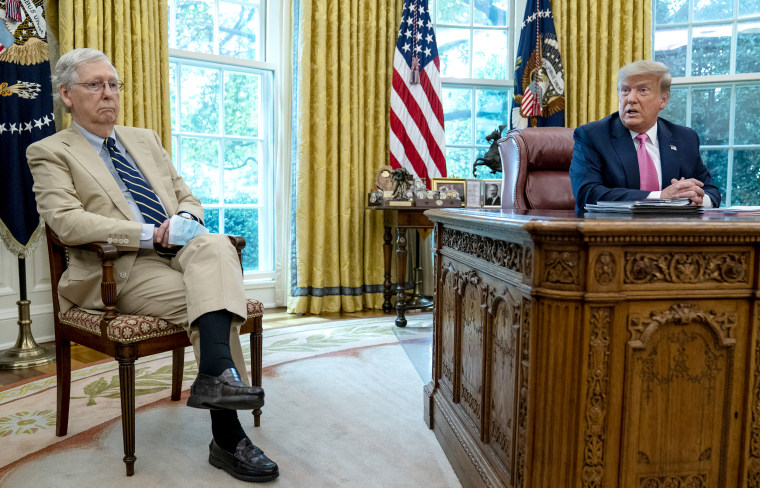Everyone on Capitol Hill and in the White House has known for a while that the CARES Act's benefits would expire in July. It's why, 10 weeks ago, House Democrats approved a $3 trillion economic aid package.
As regular readers know, Senate Republicans and the White House responded by condemning the progressive plan, while suggesting they'd eventually get around to proposing a GOP alternative.
Americans counting on Republicans to get their act together have reason to be discouraged.
Beset by internal divisions and clashes with the Trump administration, Senate Republicans downplayed the prospects Tuesday of enacting new coronavirus relief before key programs like boosted unemployment payments expire.... Talks with Democrats, who will be needed to pass the bill, haven't even begun.
At a closed-door Senate GOP meeting yesterday, Sen. Ted Cruz (R-Texas) reportedly asked his colleagues, in reference to the economic talks, "What in the hell are we doing?"
It was probably a rhetorical question, but let's go ahead and answer: what Republicans are doing is failing. With just days remaining before key economic lifelines disappear, GOP officials don't even seem to agree among themselves on the basic contours of a Phase IV aid package.
The only thing Republicans seem united on is opposition to the existing $600 weekly supplement for the unemployed -- which also happens to be one of the top priorities for congressional Democrats.
In theory, this would ordinarily be the point at which a White House team would get the president and his party aligned, but Donald Trump and his aides barely seem to be trying. A Washington Post report noted yesterday that there were intra-party talks at the White House, but the president and his team "did not go into the talks with a preset strategy or a list of proposals that they knew GOP lawmakers would rally behind. This miscalculation created immediate problems."
Reporters late yesterday asked Senate Majority Leader Mitch McConnell (R-Ky.) whether he expects Congress to pass an aid package by the end of next week. The Republican senator not only said, "No," reporters also heard him laugh at the question.
I can understand why -- the idea of GOP officials successfully governing is, too often, laughable -- though there's nothing funny about the circumstances. As we discussed yesterday, the clock is ticking for millions of families facing a brutal cliff.
As the New York Times' Paul Krugman explained in a recent column, the $600 weekly supplement for the unemployed "applies only to benefit weeks that end 'on or before July 31.' July 31 is a Friday. State unemployment benefit weeks typically end on Saturday or Sunday. So the supplement will end, in most places, on July 25 or 26, and millions of workers will see their incomes plunge 60 percent or more just a few days from now."
What's more, an NBC News report added this week, "With no national moratorium on evictions, most protections were put in place on the state and local levels, and they either have already expired or will expire within a few weeks. A federal law barring evictions from properties serviced by federally backed mortgages comes to an end Saturday."
That's this Saturday -- which is to say, the eviction moratorium for federally backed mortgages ends this week, shortly before enhanced unemployment benefits expire.
Republicans have had 10 weeks to formulate a plan, but they don't appear to know what they're doing. One might even be tempted to say the GOP has made the transition away from being a governing party and has instead become a post-policy party.

